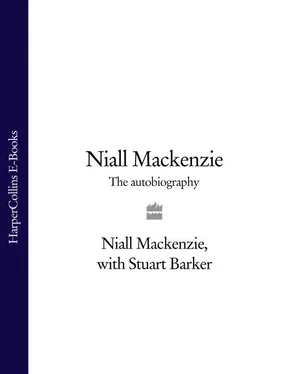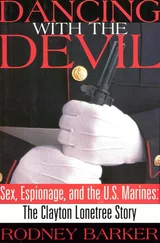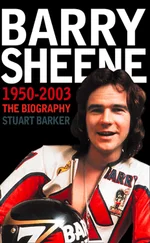So let me just put the record straight. Fankerton is situated about a mile from Denny in Central Scotland and it’s just a tiny village of around sixty houses, most of which were built to provide homes for the local papermill workers.
I was brought home there to a council house at 3 Myot View after being delivered at Stirling Royal Infirmary at 3.15pm on 19 July 1961 and my parents called me Niall Macfarlane Mackenzie – a name as suited to Grand Prix racing as my background was.
My father Neil, chose the Gaelic spelling of his own name for me since he came from Inverness, the capital of the Scottish Highlands and a city steeped in Gaelic tradition. The pronunciation, incidentally, is the same as with the standard spelling of the name, although that fact has been lost on many TV commentators who have who persisted in pronouncing it ‘Nyall.’
Dad was a qualified engineer but spent twentythree years working in India as a tea plantation manager before returning to Scotland in the late 1950s and marrying my mum, Amelia Macfarlane. I was an only child but I’ve got three half-brothers, John, Brian and Colin, from my dad’s first marriage.
Dad lost most of his savings from India in a succession of ill-advised business investments and he returned to engineering work to support my mum, who worked as a secretary, and myself. We weren’t exactly on the breadline but there wasn’t a lot of extra cash for luxuries and from a very early age, I knew that if I wanted something extra, I was going to have to work for it.
So, straight from primary school I helped on a farm carrying milk from the milking parlour to the tank. I was paid ten bob (50p) a week and I loved it. I knew there was no money in paper rounds so as soon as my parents allowed me to, I got up before school and did a milk round for £8 a week and also worked on the farm. It was good fun as well as being an earner, and me and my mate Beefy thought we were the sharpest milkmen in Scotland.
My mum opened a bank account for me with my christening money when I was very young and I was fascinated by how money could just grow if you left it there. To me, interest was money for nothing and I thought that was great. I’m not tight, you understand, but I’ve just always been a good saver. I don’t know if it’s a security thing but it definitely came from my mum. She was always good with money and that grounding has stood me in good stead throughout my career.
I suppose my childhood was much the same as any other kids growing up in rural Scotland at the time. Cash may have been tight but as long as there were rivers, forests and glens to play in, boys could be boys, knees could be muddied and everyone was happy. Having a friend who lived on a farm helped too. All the kids congregated at the farm and if you wanted to work there you could. I suppose it was slave labour in a way but we loved it all the same.
The farm seemed more like an adventure playground than a workplace with all the tractors and machinery to play on and the tunnels that we explored in the haysheds.
Some of the funniest times I experienced as a kid was when I played ‘The Grand National’ and ‘Chap Door Run’ with my pals. There was a big square of council houses that had all their gardens backing onto each other and the aim of ‘The Grand National’ was to make a run for it and throw yourself over all the hedges while being chased by the people who lived in the houses. It was a particular favourite with me and my mate Hammy. ‘Chap Door Run’ is just one of a thousand names for every kid’s other favourite game – knocking on doors and running away! Well, at least we were getting exercise.
But while my childhood was relatively carefree, and even financially productive to a certain extent, my teenage years were more trying. In 1975 when I was just thirteen, my father died after a long history of health problems. He had a heart condition mainly due to working too hard and playing too hard; he had just hammered himself when he lived in India. He’d been teetotal ever since I was born but the damage had already been done after years of playing too much polo and drinking too much whisky – not a good combination.
My father’s death not only affected my teenage years, it also affected my career prospects as having a motorbike when dad was alive just wasn’t an option. He actually had a 350 AJS at one point and used to ride it fifty miles to and from work every day as my uncle Alick still reminds me. But when it came to me having a bike, he gave me the usual speech about money and safety like most parents do. So if my dad hadn’t died, I might never have become a bike racer because he really wasn’t keen on the whole motorbike thing. Maybe because he’d owned one he was more aware of the dangers than most.
I know that lots of kids who lose a parent can be psychologically scarred for life, but somehow I quickly accepted the reality of the situation. To be honest, it was almost a relief when he died because he’d been ill for three years and it was so sad to watch him deteriorating. I loved him to bits and was probably closer to him than to my mum but in a way I was prepared for his death. I shed a few tears with my mum that night but went back to school a week later and tried to carry on. There were a few tears at school too because kids can be so cruel about things like that, but after a few weeks I was fine and just got on with my life. In fact I received a lot of attention for having lost my father and quite enjoyed it.
As a rule, I wasn’t a bad kid but I was definitely given more of a free rein by my mum and my teachers because my dad was dead. It sounds terrible but I actually loved the freedom of not having a father figure around. I didn’t completely abuse that freedom but there was a lot less discipline in my life than some of my mates had to put up with. I was never one to hang around the graveyard smoking fags, doing drugs and getting drunk all the time – it just wasn’t my thing – but I had a few Strongbow Cider experiences and generally goofed around a bit more than before.
Like I said, I didn’t abuse my new-found freedom but like most young boys, I overstepped the mark on a few occasions and faced the wrath of the law as well as that of my mum, particularly when I stole my friend’s dad’s car.
I had learned to drive tractors when I was very young so I could drive a car with no problem, long before I was old enough to drive legally. My mates and I didn’t go to school much in our final year and we thought it would be a good idea to ‘borrow’ a car to cruise around in to pass the time and show off. So the four of us, me, Shanksy, Stoney and Bunny (Stoney would come back to haunt me on the other side of the world years later when I was racing in GPs), started to drive around in the car quite regularly. I suppose it was only a matter of time before we got caught. We eventually got too cocky and once when we were parked behind the ice cream van at the school gates, a flashing blue light came up behind us. I floored the accelerator and took off, getting chased round the streets until I finally got some distance between us and the police, ditched the car and made a run for it. I got out and ran off as did Shanksy who was in the passenger seat, but the child locks were on in the back and Stoney and Bunny couldn’t get out. They were sitting ducks for the cops to nab and were taken straight down to the police station and photographed and fingerprinted like real criminals. They eventually ‘squealed’ and told the cops everything and I got fingered as the driver.
Up to that point, my mum had never hit me, and my dad had never laid a finger on me when he was alive, but that night my mum attacked me, pulling my hair and kicking and screaming like a banshee. I didn’t like seeing her in such a state and I realised I’d made a mistake that I didn’t want to repeat so I tried to behave myself a bit more after that.
Читать дальше












